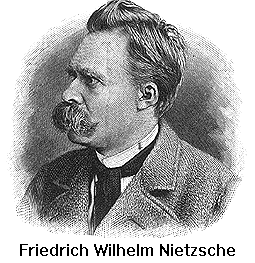| Main | Art | Literature | Music | Film | Philosophy | Photography |

12/05/96
Was Nietzsche an "egoist?" The answer to the question must be dependent upon ones' perspective. The question itself pre-supposes the correctness of the very moral codes which Nietzsche looked upon with contempt. Nietzsche was without a doubt in opposition to the "unegoists," but he would also have been against being labeled an egoist and stuck with the connotations that go with the label. He would, I believe, have answered the question, if he considered it at all, by refuting it as a question only one steeped in "slave morality" would ask.
The traditional moralist position would say that it is our ability to give up ones own interests in favor of those of our brother that hold society together and make us civilized. To give up oneself requires the greatest of strength and embodies the noblest of principles. There is no higher purpose than to lose oneself through service to another. The best example of this is the great strength it took for Jesus to allow himself to be put to death on the cross and that this self-sacrifice for the entirety of mankind was the most noble thing which has been done by any man in history. To be meek and humble is to be virtuous.
Nietzsche's point of view is that traditional moral thought stems from weakness, fear, resentment and envy of the truly noble and strong. The morality of the noble strong individual, "master morality," which Nietzsche seems to believe to be more life-affirming than "slave morality," stems from the noble man's belief in the rightness of himself. "What is harmful to me is harmful in itself... The noble human being honors himself as one who is powerful," (BGE: 260). He looks on meekness and humility with contempt.
There is no doubt that Nietzsche thought "master morality" to be better suited life, but he didn't completely endorse it. He sought rather to call into question our blind acceptance of moral values.
- "One has taken the value of these "values" as given, as factual, as beyond all question; one has hitherto never doubted or hesitated in the slightest degree in supposing "the good man" to be of greater value than "the evil man," of greater value in the sense of furthering the advancement and prosperity of man in general (the future of man included). But what if the reverse were true?"
(Preface to GM: 6)
- "But have you ever asked yourselves sufficiently how much the erection of every ideal on earth has cost? How much reality has had to be misunderstood and slandered..."
(GM: II, 24)
Though he thought it must eventually come for the betterment of mankind, he said himself that he was not the one to create the newer, better, more life-enhancing set of moral beliefs.
- "At this point it behooves me only to be silent; or I shall usurp that to which only one younger, "heavier with future," and stronger than I has a right--that to which only Zarathustra has a right, Zarathustra the godless.--"
(GM: II, 25)
Is Nietzsche an "egoist?" The answer to the question must be dependent upon ones' perspective. There is no doubt that he was against the self-denying "slave morality" which characterizes modern Western ethics and that he much preferred a "nobler," more life-enhancing system which he called "master morality," but his writings all point to the fact that he held neither system to be truth. He sought rather to return man to what he perceived to be a more natural state, to give us back our instincts and free us from the self-cruelty that he saw in traditional moral beliefs. If one must put a label on him, perhaps "naturalist" would be more apt.